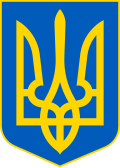Background
Shadow governments are not officialised in Ukraine, nor do they hold any real power and significance. However, a few of them have been formed or tried to be formed before: Yulia Tymoshenko has previously led an opposition shadow government of the Hromada party in 1998, [2] Our Ukraine had proposed to form shadow governments twice: in 2002 [3] and 2006. [4]
By the 2007, when after a long-lasting political crisis, which led to the snap 2007 parliamentary election, the "orange coalition" blocs, BYuT and NUNS, agreed to form a coalition government, [5] largest opposition party in the Verkhovna Rada, Party of Regions, pledged to form a shadow cabinet, if party becomes the opposition. [6] Despite Yanukovych's wishes to form a "united opposition government", other two opposition factions, Lytvyn Bloc and Communist Party of Ukraine stated that they would not join the shadow cabinet. [7]
On 21 December 2007, the shadow cabinet of Viktor Yanukovych gathered for their first meeting in the former headquarters of Yanukovych's presidential campaign team, the Zoryanyi cinema building. Later that day, PR representative, Serhiy Lyovochkin refused to call the cabinet a "shadow" one, and preferred for it to be called "an opposition cabinet". [8] Lyovochkin also added that there would be vacant positions inside the cabinet, like the culture and health ministries, which are available for the other opposition parties, in case of the opposition coalition expansion. [8]
This page is based on this
Wikipedia article Text is available under the
CC BY-SA 4.0 license; additional terms may apply.
Images, videos and audio are available under their respective licenses.

